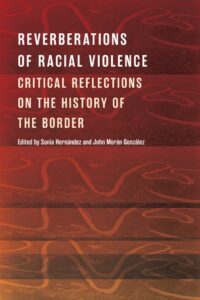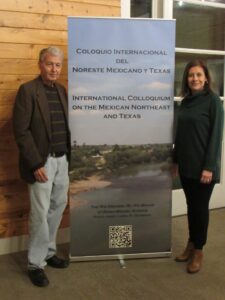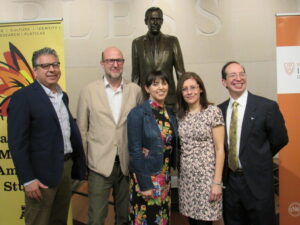Illuminating Humanities: Sonia Hernández
Highlighting Humanities Research and its Impact
Sonia Hernández | Department of History
by Megan Bodily

The Glasscock Center is excited to continue this series that highlights humanities research at Texas A&M, as well as the vital role played by the humanities beyond the academy.
For this highlight, we invite Dr. Sonia Hernández to tell us about how the Glasscock Center has supported her work over the last several years, including two conferences.

Dr. Sonia Hernández, Professor, Department of History, Texas A&M
Dr. Sonia Hernández is a Professor in the Department of History and affiliated faculty with Women’s & Gender Studies and Latino/a & Mexican American Studies. She focuses on the intersections of gender and labor in the US-Mexican Borderlands, Chicana/o history, and Modern Mexico. Dr. Hernández recently learned of her receipt of a National Endowment for the Humanities (NEH) Award for Faculty at Hispanic-Serving Institutions to support her current research project, “Revisiting Cortez: Gender, State Violence, and the Forging of (Un)Likely Transnational Alliances.” Her most recent publication, “Gendering Transnational State Violence: Intertwined Histories of Intrigue and Injustice along the U.S.-Mexican Borderlands, 1900–1913”, examines the violence along the borderlands through the experiences of two Mexican-origin women: Leonor Díaz, arrested in 1901 in Texas, and Asención Paz, arrested in 1910 in Mexico.
As a publicly engaged historian, Dr. Hernández pursues traditional academic scholarship channels like publications but places equal value on non-traditional academic pursuits, such as curating museum exhibits and organizing conferences that reach non-academic audiences.

The cover of the scholarly anthology composed of essays from the Reverberations of Racial Violence conference edited by Dr. Sonia Hernández and Dr. John Morán González (University of Texas at Austin).
Dr. Hernández received a Symposium and Small Conference Grant from the Glasscock Center to support a conference she co-organized with John Morán González, a Professor in the Department of English at The University of Texas at Austin, called “Reverberations of Racial Violence.” The conference, which took place at the Bob Bullock State Museum in Austin, Texas, from January 31 to February 1, 2019, commemorated the 100th anniversary of the first state-led probe into the Texas Rangers’ abuse of power. José Tomas “J.T.” Canales, the lone Mexican American State legislator at the time, initiated and led the 1919 investigation. The Texas State Senate adopted Senate Resolution No. 87 on January 29, 2019, which publicly acknowledged the conference. Dr. Hernández says that this resolution, important because of its recognition of the impact of the Canales investigation, also inscribed the conference into the archives, saying that it will “forever be on record.”
“I am forever thankful to the Glasscock Center for their support for such a wonderful conference because it was so meaningful,” Dr. Hernández says. “We wanted to reflect upon this moment [the Canales investigation] as a learning opportunity and as a moment that really ushered in Mexican-American Civil Rights.”
Dr. Hernández received support from the Glasscock Center to organize a second conference called “Shared Histories in the Borderlands/Historias Compartidas en Espacios Fronterizos,” which was held from November 16 to 17, 2022, at Texas A&M University. The bilingual conference focused on borderlands’ history and brought together scholars from Northern Mexico and Texas to talk about border issues from an interdisciplinary perspective.

Keynote speaker, Dr. Miguel Ángel González-Quiroga, and Dr. Sonia Hernández at the Shared Histories in the Borderlands/Historias Compartidas en Espacios Fronterizos. Photo courtesy of Dr. Sonia Hernández.
Both conferences pursued broadening scholarship beyond the current discourse by encouraging reflection and engagement across disciplines and nations.
“It’s (conference) never an endpoint, it’s an ongoing conversation; I can’t emphasize this enough, but the Glasscock Center made it all possible,” Dr. Hernández says.
Dr. Hernández’s work is integral to the growing focus on Mexican origin, working-class women along the US-Mexico border from a transnational perspective. She is currently researching the near-lynching of Gregorio Cortez, a Mexican migrant cowboy, in 1901 in Central Texas who shot a white sheriff in self-defense. She revists this incident to understand how it affected Cortez’s first wife, Leonor Díaz de Cortez, who was unlawfully held with her four children in a Texas jail while her husband evaded capture (and even after his apprehension). By approaching the near lynching through the lenses of gender and transnationalism, Dr. Hernández highlights histories often left uncovered in popular narratives.
“For many years, for decades, the historiography [of the border] was pretty one sided—it was very male centric and also was heavily focused on [the U.S.] side of the border…[border scholars from both the US and Mexico] were hardly in conversation with one another,” she says.

Co-founders of Refusing to Forget at the Reverberations of Racial Violence Conference (left to right): Dr. Trinidad Gonzales (South Texas College), Dr. Benjamin H. Johnson (Loyola University Chicago), Dr. Monica Muñoz Martinez (University of Texas at Austin), Dr. Sonia Hernández (Texas A&M University), and Dr. John Morán González (University of Texas at Austin). Photo courtesy of Dr. Sonia Hernández.
Dr. Hernández’s research centers on the role of the State, in all its manifestations, and its complicity in encouraging or enacting violence. She emphasizes the role of checks and balances and their relationship to the abuse of power and the importance of talking about those abuses. “When we talk about history and the relevancy of it, one of the uses of history is how it helps us understand our present,” she says.
Additionally, Dr. Hernández is a co-founder of the award-winning public history project and nonprofit organization, Refusing to Forget, which aims at bringing public awareness to the state-sanctioned violence directed at ethnic Mexicans living on the Texas-Mexico border between 1910–1920. The website provides information and resources for learning about the violence navigated by the Mexican-American community during that time period. It also promotes a history of the Mexican-American community as resilient—it was not a community standing idle. An exhibition curated by Refusing to Forget titled “Life and Death on the Border 1910–1920” is currently traveling to different cities across Texas.
“I can’t emphasize enough the crucial role that [the Glasscock Center] has had in my research,” Dr. Hernández says. “The support of the Glasscock Center and the opportunities it offers, especially during a time when humanities has been under assault, can be career changing and can have a real impact on the discipline.”
